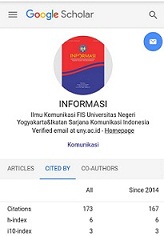The role of social capital in the task force for preventing and handling sexual violence on campus
Cut Meutia Karolina, Universitas Al Azhar Indonesia, Indonesia
Abstract
Higher education institutions are required to establish a Task Force for the Prevention and Handling of Sexual Violence (PPKS). The presence of the PPKS Task Force within the campus requires thorough preparation so that its existence can be accepted and beneficial. Therefore, this research aims to examine how social capital is utilized by PPKS Task Force to strengthen its presence. The concept of social capital in organizational management is used for analysis. Using a qualitative approach, data collection was conducted through interviews with the chairperson and members of PPKS Task Force in three campuses where the PPKS Task Force has been established for more than 6 months. The research findings indicate the existence of bonding social capital through the reinforcement of vision, mission, and shared perceptions among Task Force members, which serves as an initial step before engaging in other activities. Additionally, there is bridging social capital through trust and support from the campus’s internal stakeholders and related parties directly associated with the campus. Another crucial aspect is linking social capital through collaboration with external parties and various entities capable of providing support for PPKS Task Force activities and tasks.
Keywords
Full Text:
PDFReferences
Alfitri. (2023). Pengukuran modal sosial. Penerbit Idea Press.
Claridge, T. (2014, August 3). What is social capital? Accessed https://www.socialcapitalresearch.com/what-is-social-capital/
Claridge, T. (2018, January 2). What is the difference between bonding and bridging social capital ? Accessed https://www.socialcapitalresearch.com/
Claridge, T. (2018). Introduction to social capital theory. Social Capital Research.
Fathy, R. (2019). Modal Sosial: Konsep, Inklusivitas dan Pemberdayaan Masyarakat. Jurnal Pemikiran Sosiologi, 6(1), 1-17. https://doi.org/10.22146/jps.v6i1.4746
Ganguly, A., Talukdar, A. & Chatterjee, D. (2019). Evaluating the role of social capital, tacit knowledge sharing, knowledge quality and reciprocity in determining innovation capability of an organization. Journal of Knowledge Management, 23 (6), 1105-1135. https://doi.org/10.1108/JKM-03-2018-0190
Kemendikbudristek. (2021). Peraturan Menteri Pendidikan Kebudayaan, Riset dan Teknologi nomor 30 tahun 2021 tentang pencegahan dan penanganan kekerasan seksual di lingkungan perguruan tinggi.
Kemendikbudristek. (2022). Buku pedoman pelaksanaan peraturan Menteri Pendidikan Kebudayaan, Riset dan Teknologi nomor 30 tahun 2021 tentang pencegahan dan penanganan kekerasan seksual di lingkungan perguruan tinggi.
Khairunnisa, P. (2023, October 25). Guna pencegahan dan penanganan kekerasan seksual di perguruan tinggi, kemendikbudistek menggelar rakornas bersama satuan Tugas PPKS. https://itjen.kemdikbud.go.id/
Lauricella T., Parsons, J., Schaninger, Bill., & Weddle, B. (2022, August 2). Network effects: How to rebuild social capital and improve corporate performance. McKinsey & Company. Accessed https://www.mckinsey.com/capabilities/people-and-organizational-performance/our-insights/network-effects-how-to-rebuild-social-capital-and-improve-corporate-performance
Marthalia, D. (2022). Tinjauan kritis dampak keadilan organisasi melalui modal sosial terhadap kepuasan individu dan komitmen organisasi. Sang Pencerah. Jurnal Ilmiah Universitas Muhammadiyah Buton, 8(2), 530-538. https://doi.org/10.35326/pencerah.v8i2.2244
Nurjanah, A., Mutiarin D., Supangkat G., & Iqbal, M. (2022). Aisyiyah organizational communication in realizing the true islamic society. Jurnal ASPIKOM, 7(1), 142-157. http://dx.doi.org/10.24329/aspikom.v7i1.895
Pitas, N.,& Ehmer, C. (2020). Social capital in the response to COVID-19. American Journal of Health Promotion, 34(8), 942-944. https://doi.org/10.1177/0890117120924531
Prayudi, Ardhanariswari, K.A., & Probosari, N. (2020). The quadruple helix communication model in Yogyakarta’s creative city development. Jurnal ASPIKOM, 5(2), 294-306. http://dx.doi.org/10.24329/aspikom.v5i2.704
Puput & Prima. (2023, February 2). 100 persen PTN bentuk PPKS Task Force, bukti komitmen kampus merdeka dari kekerasan seksual. Accessed https://www.kemdikbud.go.id/
Ramadhan, G., Wulandari, A.P., & Apsari, N.C. (2023). Hubungan antara perilaku kekerasan seksual dengan kondisi lingkungan fisik di kampus Unpad Jatinangor: Sudut pandang mahasiswa. Jurnal Ilmiah Rehabilitasi Sosial, 5(1), 29-45. https://doi.org/10.31595/rehsos.v5i1
Santoso, Thomas. (2020). Memahami modal sosial. Pustaka Saga.
Seferiadis, A. A., Cummings, S., Zweekhorst, M. B. M., & Bunders, J. F. G. (2015). Producing social capital as a development strategy: Implications at the micro-level. Progress in Development Studies, 15(2), 170-185. Accessed https://doi.org/10.1177/1464993414565530
Sidiq, S.S. (2019). Pemberdayaan berbasis modal sosial. Penerbit Taman karya.
Tjahjono, H.K. (2017). Modal sosial sebagai properti individu: Konsep, dimensi dan indikator. Jurnal Bisnis Teori dan Implementasi, 8(2), 184-189. Accessed https://doi.org/10.18196/bti.82092
Widiyanti, R., Wuryaningsih, T., & Lestari, S. (2023). Kampanye media berperspektif gender dalam upaya pencegahan kekerasan seksual pada instagram PPKS Task Force. Jurnal Sosiologi Andalas, 9(2), 193-210. Accessed https://doi.org/10.25077/jsa.9.2.194-211.2023
Wijaya, A.A.M.,& Salam, S. (2019). Modal Sosial untuk Pengembangan Organisasi: Studi pada Aisyiyah Kota Baubau. Jurnal Sains Sosial dan Humaniora, 3(1), 11-20. Accessed http://dx.doi.org/10.30595/jssh.v3i1.3843
Yasintha, M. (2022). Pembentukan panitia seleksi dan satuan tugas pencegahan dan penanganan kekerasan seksual. Accessed https://lldikti3.kemdikbud.go.id/
Zarkasi, I.R., Karolina, C.M.,& Rizqullah, M.S. (2023). The #permendikbud30 controversy over the prevention and handling of sexual violence in higher education on social media. Jurnal Komunikasi Ikatan Sarjana Komunikasi Indonesia, 8(1), 29-38. Accessed http://dx.doi.org/10.25008/jkiski.v8i1.788
DOI: https://doi.org/10.21831/informasi.v54i1.77000
Refbacks
- There are currently no refbacks.
Copyright (c) 2024 Irwa Rochimah Zarkasi, Cut Meutia Karolina
Supervised by
Our Journal has been Indexed by:
Informasi by http://journal.uny.ac.id/index.php/informasi is licensed under a Creative Commons Attribution-NonCommercial 4.0 International License.














